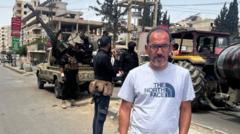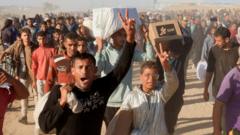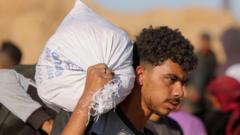On the morning of May 9, a BBC Arabic team consisting of seven members made their way from Damascus to the southern province of Deraa, aiming to document conditions near the border with the Israeli-occupied Golan Heights. Tensions have heightened in this area since Israel asserted control over a demilitarized buffer zone following strategic changes in Syrian governance.
The team, which included a British journalist, two Iraqi staff, and four Syrian freelancers, began filming close to a UN observation post near al-Rafeed. Their identification as a BBC crew was acknowledged by UN officials; however, it did not shield them from the imminent confrontation with Israeli forces.
Shortly after, four Israeli soldiers approached in a white vehicle, brandishing rifles and demanding the team place their equipment aside. Despite attempts to identify themselves as journalists, the situation rapidly escalated. The team’s communications were cut off as their media gear was confiscated, and they were subjected to a tense and powerless state.
The crew was forced into a confinement area in the city of Quneitra, near an Israeli checkpoint. Hours passed as the soldiers faced them with weapons drawn and scrutinized their recorded footage under duress. The lead officer initiated an interrogation—eschewing handcuffs for the journalist individually while isolating him from his team, who were treated more harshly.
Insults and threats ensued, including an invasive search process and intimidating questions about personal life, suggesting the soldiers were determined to assert control over the narrative. The journalists’ identities and credibility as a media team were disregarded, showcasing the precarious existence journalists face in volatile regions.
After enduring over seven hours of detention, the team was eventually released outside the Quneitra border but found themselves vulnerable—lost, without communication, and in the dark. With assistance from local villagers, they navigated their way back to safety in Damascus, further illustrating the unpredictable and often dangerous realms of journalism in conflict zones.
This incident underscores the critical challenges that journalists encounter, emphasizing the importance of protecting press freedom regardless of geopolitical tensions and military actions.





















